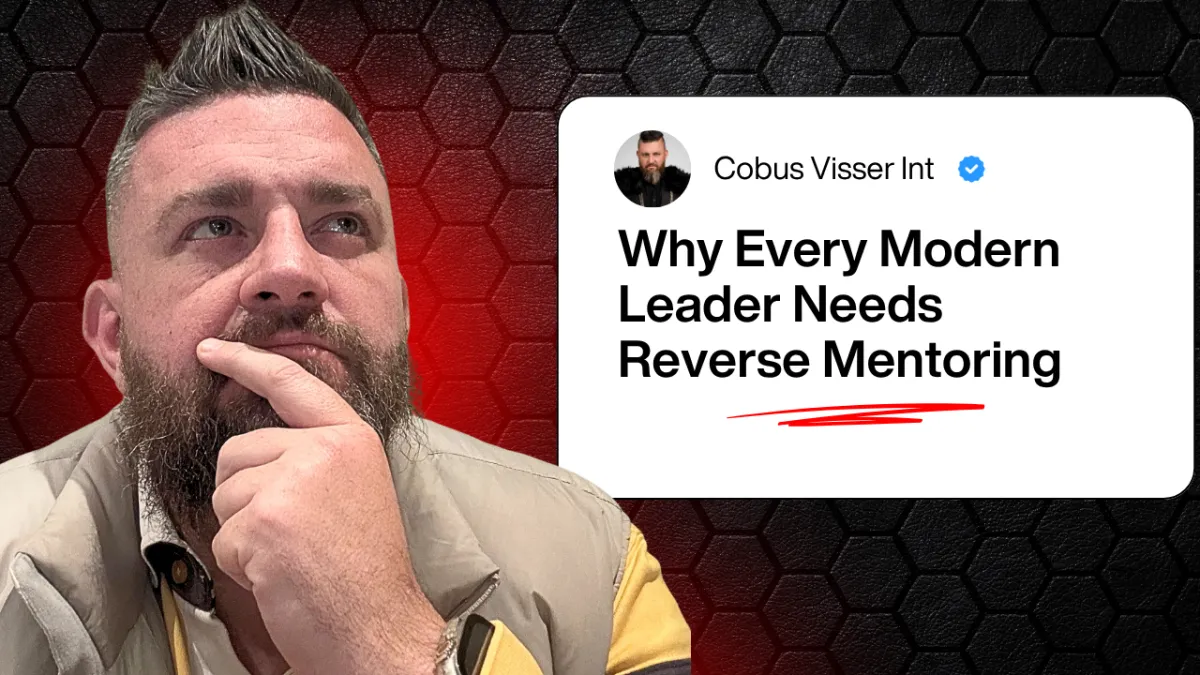
Why Every Modern Leader Needs Reverse Mentoring
A few mornings ago, while planning our upcoming discussion on leadership, I found myself thinking about a concept that keeps resurfacing in conversations shaping the future of business, specifically reverse mentoring. I first heard about it through futurist John Sanei, who spoke about the importance of learning from those who are younger than us, not just those who came before.
It’s an idea that inverts the traditional hierarchy of mentorship. For years, we’ve been told to seek out mentors who are older, more experienced, and further along the path, people who have “been there” and can show us the way. That kind of wisdom is still invaluable, but in today’s world, it’s no longer enough. Leadership in 2025 demands something more dynamic, more reciprocal. It demands that we learn in both directions.
Reverse mentoring challenges the old idea that wisdom only flows down. It asks us, as leaders, to become students again to listen, to observe, and to understand a generation that is reshaping the way the world works.
The Blind Spot in Modern Leadership
The biggest leadership blind spot today isn’t in strategy or operations; it’s in relevance. Many leaders are trying to lead teams half their age, sell products to customers they no longer understand, and build cultures that appeal to people who see the world completely differently. The gap isn’t just about knowledge, it’s about perspective.
Gen Z is not just entering the workplace; they’re transforming it. They care about flexibility, inclusivity, authenticity, and impact, not as corporate slogans but as the minimum standard. They value freedom more than hierarchy, collaboration more than control. And they communicate in ways that are fast, informal, and deeply digital.
When leaders don’t understand that rhythm, it’s not just an HR issue; it’s a business risk. We end up designing work environments and customer experiences that miss the mark. We lead teams that are present in body but disengaged in spirit. We talk about innovation while quietly becoming outdated ourselves.
This is where reverse mentoring comes in. It is not a trend; it is a survival skill.
Learning from the Generation You’re Leading
Imagine sitting across from someone who grew up in a world you didn’t. They have never known life without the internet, without social media, without instant access to global information. They process change differently. They move faster, question more, and expect transparency as a given.
Now imagine letting that person mentor you. Not because they have more experience in years, but because they have more fluency in the present. Reverse mentoring is not about giving away authority. It is about gaining perspective.
It’s the courage to say, “Show me how you see it.”
I’ve seen this shift happen in rooms where CEOs ask their youngest employees to teach them about new tools, trends, and cultural shifts. Something remarkable happens when they do. The dynamic in the room changes. Hierarchy softens. Curiosity replaces defensiveness. The conversation becomes human again.
Reverse mentoring reminds us that leadership is not about always knowing; it’s about always learning. It’s a reminder that listening downward is just as important as looking upward.
The Strategic Advantage of Staying Curious
There’s a misconception that mentoring is only about career growth. In truth, it’s about market insight.
If you are leading a company, your younger employees are not only your next generation of managers. They are also your customers, your influencers, and your partners in the digital economy. The same generation you are trying to reach externally is already sitting inside your business.
When you invite them to mentor you, you get something that no consultant can sell unfiltered access to how the next generation thinks. You understand their motivations, frustrations, and expectations. You stop guessing what they value, and you start seeing it.
That insight is gold. It informs how you communicate, how you market, and how you design products and experiences that feel real to the people who will buy them.
Leaders who embrace reverse mentoring don’t just stay relevant they stay ahead.
The Humility to Lead Differently
Reverse mentoring is not easy. It requires humility. It demands that we set aside ego and the idea that experience always equals expertise. In a world that changes this fast, experience can sometimes slow us down.
The best leaders I know are those who remain endlessly teachable. They are confident enough to lead and humble enough to learn. They are grounded in what they know but curious about what they don’t.
That combination of confidence with curiosity is what separates authority from influence. It’s what makes people want to follow you, not because they must, but because they trust you are still growing with them.
Leadership is not about being the oldest voice in the room; it’s about being the most open.
Leadership with Fire and Heart
In my own work, whether it’s in a boardroom or at a firewalking event, I’ve seen one truth hold steady: real growth starts the moment you step into discomfort.
Reverse mentoring is that kind of step. It’s uncomfortable at first to admit there’s something you can learn from someone younger, someone who sees the world differently. But that discomfort is where transformation begins.
When leaders open themselves to learning from their teams, trust deepens. Empathy expands. Resilience strengthens. And in that space of humility, innovation finally has room to breathe.
So, I want to leave you with a question.
Who is your reverse mentor?
If you don’t have one yet, find someone younger than you, someone who challenges how you see things. Let them show you the new rhythm of work, the new pulse of culture, the new way people think. Listen not as a boss, but as a learner.
The leaders who will thrive in this next era are not the ones who know it all, they are the ones who never stop listening.
#Leadership #ReverseMentoring #BusinessGrowth #Resilience #TeamCulture #ExecutiveCoaching #ScalingWithHeart #WhateverItTakes
